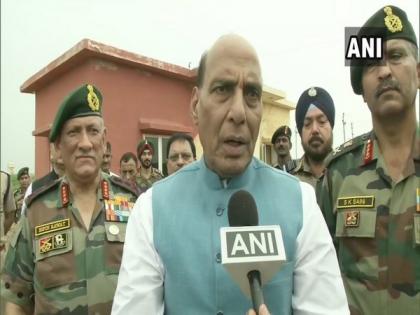India has no-first-use nuclear policy, future will depend on circumstances: Rajnath
By ANI | Published: August 16, 2019 08:45 PM2019-08-16T20:45:07+5:302019-08-16T20:55:02+5:30
In a significant remark concerning India's nuclear doctrine, Defence Minister Rajnath Singh on Friday said the country follows 'no first use' policy regarding nuclear weapons but what would happen in future depends on "circumstances".

India has no-first-use nuclear policy, future will depend on circumstances: Rajnath
In a significant remark concerning India's nuclear doctrine, Defence Minister Rajnath Singh on Friday said the country follows 'no first use' policy regarding nuclear weapons but what would happen in future depends on "circumstances".
He made the remarks at Pokhran, where he paid tributes to former Prime Minister Atal Bihari Vajpayee on his first death anniversary, drawing a swift reaction from the Congress which wanted him to spell out if there will be any change in the policy.
India's second nuclear tests were held under the Vajpayee government in 1998.
"On the question of nuclear policy, we have a policy of no-first-use so far. What happens in future will depend on circumstances," Singh told .
He paid tributes to Vajpayee at the site where the country conducted its second nuclear tests.
"In Pokhran, India emerged as a nuclear power. Despite all restraints, Atalji gave permission for the nuclear test. India was listed among those countries which have nuclear power. I paid homage to Atalji on his first death anniversary here," Singh said.
Singh's remarks on the nuclear policy have come amid belligerence displayed by Pakistan leadership after India's decision to reorgse Jammu and Kashmir into two Union Territories and repeal Article 370.
Pakistan's Prime Minister Imran Khan had earlier this week threatened to "teach Delhi a lesson" saying its Army was preparing to respond to anticipated Indian aggression in Pakistan-occupied Kashmir.
India has said that Pakistan wanted to create an "alarming picture" of bilateral relations.
The BJP in its 2014 election mfesto had said that it would study in detail India's nuclear doctrine and revise and update it to make it relevant to challenges of current times.
"BJP believes that the strategic gains acquired by India during the Atal Bihari Vajpayee regime on the nuclear programme have been frittered away by Congress. Our emphasis was, and remains on, beginning of a new thrust on framing policies that would serve India's national interest in the 21st century," the mfesto had said.
"BJP will study in detail India's nuclear doctrine, and revise and update it, to make it relevant to challenges of current times; maintain a credible minimum deterrent that is in tune with changing geostatic realities; invest in India's indigenous Thorium technology programme," it had added.
The party had also said the nuclear programme will be unencumbered by foreign pressure and influence.
"We will follow a two-pronged independent nuclear programme, unencumbered by foreign pressure and influence, for civilian and military purposes, especially as nuclear power is a major contributor to India's energy sector," it said.
Congress spokesperson Abhishek Manu Singhvi termed Singh's remarks as "somewhat ambiguous" and said if there will be a change in nuclear policy, it should be stated.
He told reporters in response to a query that everybody stands behind the nation and the government as far as "defence, sovereignty, and nuclear policy" are concerned.
"However, with this somewhat ambiguous statement, the Defence Minister either intends to keep us guessing or seeks to announce a change in policy."
"The country will be happy to know what the new policy is. But it should not be in ambiguous half-phrases but a full one paragraph declared policy," he said.
Singhvi said the party will welcome the policy. "Whatever the policy is, we will welcome it and stand behind it. Do not do wordplay on something vital and important as nuclear policy," he said.
India's nuclear doctrine is based "on a policy of minimum credible deterrence with a posture of no-first-use and non-use of nuclear weapons against non-nuclear weapon States".
At the same time, India has also called on all possessor states to engage in a mengful dialogue to build trust and to reduce the salience of nuclear weapons.
India was among the earliest advocates for the complete elimination of nuclear weapons and has attached "the highest priority" to the goal of universal nuclear disarmament.
( With inputs from ANI )
Open in app